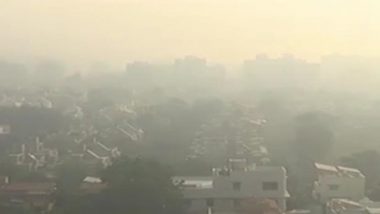Jalna, April 9: The National Clean Air Programme (NCAP) implemented Maharashtra's Jalna over the last three years has not had a desired impact on the city's air quality, an official of the NCAP said on Sunday.
Launched by the Ministry of Environment of Forest and Climate Change, the NCAP is being implemented in Jalna since 2020 to reduce air pollution and Rs 1.24 crore have been spent for the same so far, he said.
While the NCAP had set a target of reducing key pollutants PM 10 by 5 units, the Jalna Municipal Council (JMC), which is the nodal agency for implementing the programme, has only managed to bring it down by 2 units, the official said. NASA Launches Device to Monitor Air Pollution from Space.
Under the NCAP, the JMC has constructed vertical gardens, water fountains, concrete roads and carried out plantations in the city over the last three years, said Sayyed Saud, an engineer from the civic body.
The Central Pollution Control Board (CPCB) in 2019 had declared 131 cities as the most polluted or non-attainment cities for consistently failing to meet the national air quality standards, following which the NCAP was launched by the ministry.
Three cities of Marathwada — Jalna, Latur and Aurangabad — had made it to the most polluted list. Speaking about the programme, the NCAP official said it envisages achieving reductions of up to 40 per cent or meet the National Ambient Air Quality Standards for Particulate Matter 10 (PM10) concentrations by 2025-26. India Weather Update: Maximum Temperature to Rise by 3-5 Degrees Celsius During Next Three-Five Days in Country, Says IMD.
The PM10, which are relatively larger, coarser, and bigger particles, can irritate your eyes, nose, and throat, he said, adding that dust from roads, farms, dry riverbeds, construction sites and mines are types of PM10. In the last three years beginning 2019-2020, the programme had received funds to the tune of Rs 1.24 crore and now, Rs 3.40 crore has been sanctioned for future works, the JMC official said.













 Quickly
Quickly


